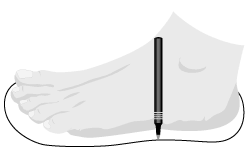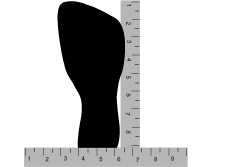Click Here to Shop This Month's Specials
Shop for Tennis, Pickleball & Padel Court Shoes by Type
- |
Like regular street shoes, athletic shoe sizing is based on the length and width of your foot. Determining your proper shoe size is essential to a comfortable fit.
Fit Tips
- Shoes that are too small are one of the major causes of foot pain and problems
- Shoes that are too large can cause blistering and a lack of stability
- Don&#rsquo;t assume your shoe size is the same as it always has been. The shape of your feet changes over time.
- Not all brands of footwear fit the same. The below generic size guide is a good indicator on what shoe size you should wear, but some brands may offer slightly different sizing guidelines.
Measurement Tips
- Take your measurements at the end of the day, when your feet are the largest
- Wear the socks you&#rsquo;ll wear with your new shoes when you measure
- Measure both feet and fit shoes to the larger foot
- If you are doing the measurement by yourself, you will get more accurate results if you sit in a chair when measuring. Don&#rsquo;t stand.
- If you have someone to help you take your foot measurement, standing is the best choice
- You may take measurements in inches or centimeters. To convert inches to centimeters, multiply inches by 2.54.
How to Measure Your Foot
- While seated, place your foot on a piece of paper in front of you
- With a pencil, trace around your foot. Hold the pencil as straight up-and-down as possible while measuring and be sure that your pencil remains in constant contact with your foot during this process.
- With a ruler, measure your tracing to determine your foot length and width
- Foot length
- To find your foot length, measure the distance between the two longest points on your tracing. Reduce this number by 5 mm, or 1/5-inch. The result is your foot length and the number you will use to determine your shoe size.
- To convert to centimeters, multiply the measurement by 2.54.
- Foot width
- To find your foot width, measure the distance between the two widest points on your tracing. Reduce this number by 5 mm, or 1/5-inch. The result is the number you will use to determine your foot width. Use the chart below to determine your foot width.








